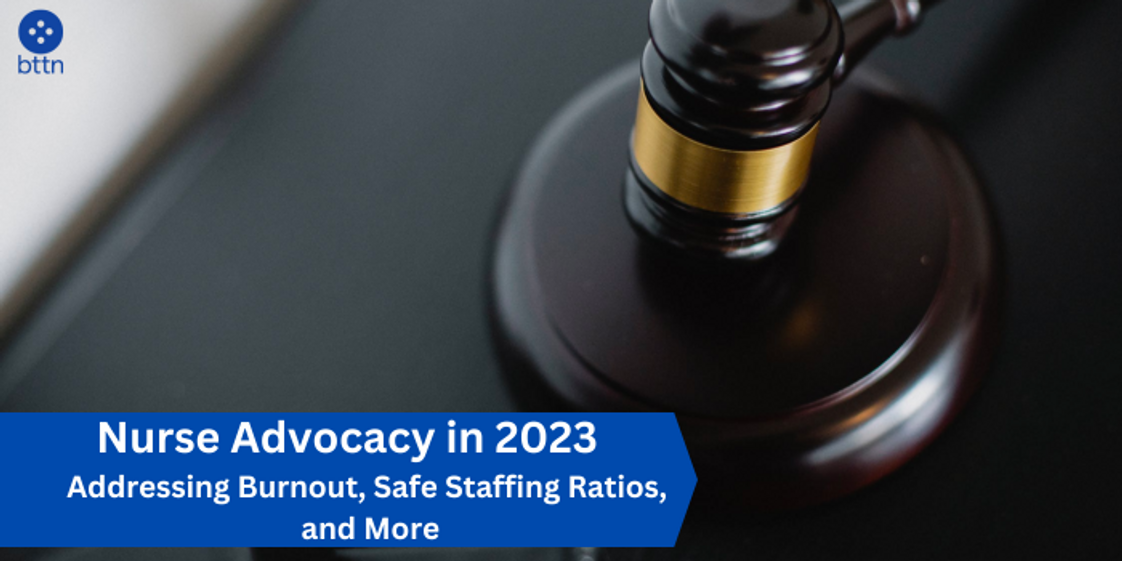
Nurse Advocacy in 2023: Addressing Burnout, Safe Staffing Ratios, and More
Posted by Pankaj Dhiman on Aug 25th 2023
The Need for Nurse Advocacy in 2023
In the complex and ever-evolving world of healthcare, nurses play a pivotal role in delivering quality patient care. Their dedication, expertise, and tireless efforts often go unnoticed, overshadowed by the larger healthcare system. As we navigate the challenges of 2023, it is crucial to shed light on the vital need for nurse advocacy. From addressing burnout to promoting safe staffing ratios, nurses are facing pressing issues in the United States that demand our attention and action.
The Essence of Nurse Advocacy
Nurse advocacy involves actively promoting the rights, well-being, and interests of nurses, as well as the patients they care for. Advocacy empowers nurses to voice their concerns, participate in policy-making, and contribute to the enhancement of patient care standards. The essence of nurse advocacy lies in recognizing that when nurses thrive, patients benefit, and the healthcare system as a whole functions more effectively.
Pressing Issues Nurses Face in 2023
1. Burnout and Mental Health Concerns: Nursing is an inherently demanding profession that requires physical, emotional, and mental resilience. However, in recent years, the issue of nurse burnout has reached alarming levels. Long shifts, high patient loads, and emotionally taxing situations have contributed to widespread exhaustion and decreased job satisfaction among nurses. In 2023, addressing burnout has become a critical concern that requires systemic changes to work hours, workload distribution, and access to mental health support.
2. Staffing Shortages: Inadequate staffing levels have a direct impact on patient care quality. Nurses are often forced to work under conditions of understaffing, which compromises their ability to provide safe and effective care. Addressing staffing shortages requires policies that ensure safe nurse-patient ratios, preventing the risk of medical errors and improving patient outcomes.
3. Professional Recognition and Development: Nurses are highly skilled professionals who continually seek to enhance their expertise through ongoing education and training. However, in 2023, the need for greater recognition of their contributions and opportunities for career development remains a challenge. Investing in nurses' professional growth is crucial for retaining experienced caregivers and attracting new talent to the field.
4. Workplace Violence: Nurses frequently face verbal and even physical abuse from patients and their families. The issue of workplace violence not only affects nurses' well-being but also poses a threat to patient safety. Comprehensive strategies, including training, security measures, and a culture of zero tolerance for violence, are essential to creating a safer work environment for nurses.
5. Ethical Dilemmas and Autonomy: Nurses often encounter complex ethical situations that require quick decision-making. However, in certain cases, nurses' autonomy to act according to their ethical judgment is curtailed by organizational policies or hierarchies. Empowering nurses to navigate ethical dilemmas while respecting their autonomy is crucial for maintaining the highest standards of patient-centered care.
The Role of Nurse Advocacy
Nurse-Patient Advocacy: At its core, nursing is a patient-centered profession. Nurse advocacy involves speaking up for patients' rights, ensuring they receive the best possible care, and acting as a liaison between patients and healthcare teams. In 2023, this role is more important than ever, as patients navigate complex treatment options and require someone to advocate for their needs.
Policy Advocacy: Nurse advocacy extends beyond individual patient interactions. Nurses can influence healthcare policy by participating in discussions about staffing ratios, workplace safety, and regulations that impact patient care. Active engagement with policymakers ensures that nurses' voices are heard, leading to policies that prioritize patient safety and nurse well-being.
Educational Advocacy: In order to effect change, nurses must be informed and empowered. Nurse advocacy also involves educating fellow nurses about their rights, professional standards, and ways to address challenges collectively. Through workshops, seminars, and online platforms, nurses can share experiences and strategies, fostering a sense of community and mutual support.
Steps Toward Positive Change
1. Collaboration: Nurse advocacy is most effective when it occurs within a collaborative framework. Collaboration between nurses, healthcare administrators, policymakers, and patients can lead to comprehensive solutions that address the multifaceted challenges nurses face.
2. Policy Reform: In 2023, advocating for policy reform is critical. Nurse organizations and leaders should work together to push for legislation that mandates safe staffing ratios, addresses workplace violence, and promotes mental health support for nurses.
3. Public Awareness: Raising public awareness about the challenges nurses encounter can garner support for change. Engaging with local communities and media outlets can shed light on the vital role nurses play and the issues they face daily.
4. Self-Care and Support: Nurses must prioritize their well-being and seek support when needed. Hospitals and healthcare institutions should implement employee assistance programs, mental health resources, and wellness initiatives to help nurses cope with the demands of their profession.
Conclusion
Nurse advocacy stands as a beacon of hope in the face of the challenges nurses are grappling with in the United States in 2023. Addressing burnout, advocating for safe staffing ratios, promoting professional growth, and ensuring workplace safety are essential components of this advocacy. By recognizing and valuing the contributions of nurses, we can create a healthcare system that not only meets the needs of patients but also nurtures the well-being of those who tirelessly care for them. As we move forward, let us stand united in our commitment to advocate for nurses and empower them to provide the exceptional care they are capable of delivering.
